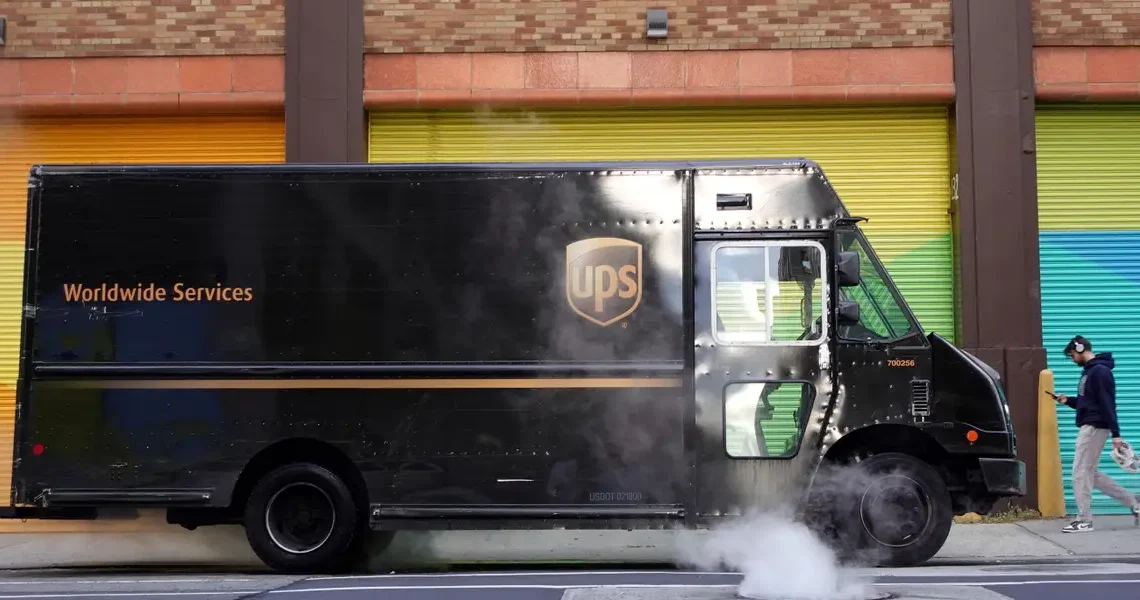Gary Hershorn/Getty Images
First came the unexpected tariff bill, then came the surprise late fee.
Oregon father Evan Scheessele told Business Insider he ordered a German analog computer kit for his son’s birthday present, only to be hit with a 250% tariff when UPS deemed it to be made entirely of copper and, somehow, entirely of Russian aluminum.
The charges meant UPS expected Evan’s son — named as the intended recipient — owed about $1,400 in duties on a parcel worth $550 in order to complete the shipment, according to invoices and shipping updates viewed by Business Insider.
Scheessele declined to pay the bill when the package arrived at his doorstep, and UPS returned it to its facility in his town in Oregon. While it’s unclear where the package is now, Scheessele assumes it has been sitting on a shelf for the past month and a half, while he contests the charge.
But UPS ratcheted up the stakes this week when Scheessele’s high-school-aged son received notice of a late charge of $142.50 for unpaid fees and a warning that those charges could go up.
Scheessele is not the only UPS customer to be hit with such fees — or threats to be referred to collections agencies. Three other people told Business Insider that they’ve faced similar late fees from UPS as they contest the service’s tariff bills. On a Reddit page dedicated to UPS issues, some posts describe receiving similar bills with late payment fees — in some cases, after a recipient refused delivery due to UPS’s tariff bill.
UPS did not respond to a request for comment on this story.
It’s the latest example of how average consumers are having to deal with tariffs — and, often, the related minutiae that were once reserved for tariff brokers and international shipping experts.
The issues have been particularly evident at UPS, where some customers have recently been informed that their international packages were marked for disposal or tariffed at rates that customers say are higher than they should be.
UPS customers face late fees — and late bills
At UPS, the problems appear to have compounded since late August, when the Trump administration eliminated the de minimis exemption, which had allowed shipments valued at less than $800 to enter the US duty-free.
On the company’s earnings call last month, UPS CEO Carol Tomé chalked up confusion over the new import rules to customers who were “naive” about the information required to collect tariffs.
“You wouldn’t expect them to understand the intricacies of trade policies,” Tomé said.
Tomé also said on the call that the volume of packages that UPS shipped into the US skyrocketed when the de minimis exemption ended.
That spike had a corresponding rise in headaches over what UPS customers say are misclassified products.
Khadija Fajry, the founder and CEO of Kenza International Beauty, said she’s been asking UPS to reduce her $6,700 tariff bill on a shipment of argon and prickly pear seed oils from Morocco. While the imports should have been tariffed at 10%, an invoice from UPS tariffed the oils at rates up to 200% — the same duty applied to Russian aluminum.
Fajry declined to pay that bill when it arrived in September. Last month, another invoice arrived, this one with a late fee of roughly 10% of the amount UPS billed for.
The bill is substantial enough to prompt Fajry to reconsider her business plan, which involves selling Moroccan oils wholesale in the US. “I’d rather just close,” she said.
In North Carolina, one customer said she received $166 worth of skin and hair care products from a company in Portugal in mid-August in order to get ahead of the impending tariffs on packages worth less than $800. The customer asked not to be named in this article, citing privacy reasons.
The following month, UPS billed her $434 — an amount, the customer said, doesn’t make sense given the contents of the package and their arrival in the US before the de minimis exemption expired. But the customer said paying the bill on time wasn’t an option: “When I received the invoice, it was past due,” she said.
In October, after refusing to pay the bill and asking UPS to correct it, the customer received another notice from UPS informing her of a $43 late fee.
“They have lawyers that can easily send this to a collections agency,” she said. “I’m very worried, and I don’t trust them.”
Some UPS customers worry about fighting collections agencies
Others who received an unexpectedly high bill from UPS are already dealing with that very issue.
Robin Donovan, a Washington state resident who ordered around $125 in auto parts from Japan this spring, told Business Insider that he got a bill for about $67 in tariff processing fees from UPS that he had been trying to dispute with the company.
Then, in October, Donovan got a letter from Receivable Management Services, which read that “UPS Supply has contracted with us to collect the debt noted above” and referenced the fees.
Donovan said he’s worried about the effect on his credit — but he’s planning to keep fighting. “It’s ridiculous that, if you have a case against them, they send you to collections,” he said.
It’s not uncommon for UPS shipping disputes to end up in collections, but it’s rare for household consumers to get caught up in the cycle, according to a source who formerly handled third-party logistics with UPS.
Scheessele, the Oregon dad, is a bit more sanguine about the issue.
“We never agreed to anything, so collections is going to have a really hard time getting my attention,” Scheessele said.
Scheessele said that could change if UPS escalates the matter in a way that puts his son’s nascent credit profile at risk.
“I don’t believe any one person at UPS thinks this is the way they want to operate, but it could get ugly,” he added.
Emma Cosgrove contributed reporting.
Do you work at UPS? Are you affected by international shipping issues? Reach out to these reporters via email [email protected] and [email protected] or by phone or Signal at 646.768.4750.
Read the original article on Business Insider
The post UPS is hitting customers with late fees and collection threats as they contest tariff bills appeared first on Business Insider.




